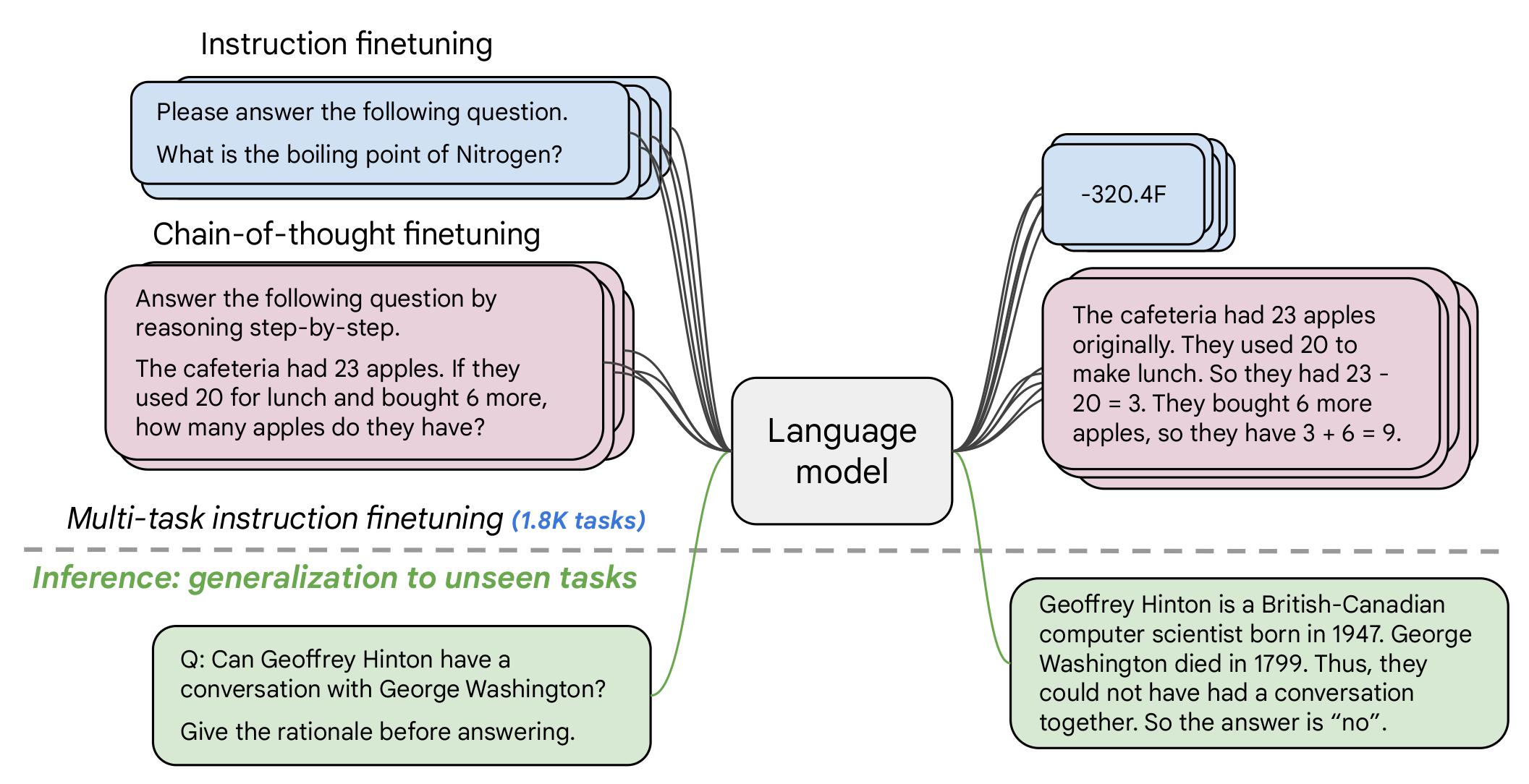This repository contains a fine-tuned FLAN-T5 BASE model designed to assist with project management tasks.
Model Card for FLAN-T5 base

Table of Contents
- TL;DR
- Model Details
- Usage
- Uses
- Bias, Risks, and Limitations
- Training Details
- Evaluation
- Environmental Impact
- Citation
- Model Card Authors
TL;DR
If you already know T5, FLAN-T5 is just better at everything. For the same number of parameters, these models have been fine-tuned on more than 1000 additional tasks covering also more languages. As mentioned in the first few lines of the abstract :
Flan-PaLM 540B achieves state-of-the-art performance on several benchmarks, such as 75.2% on five-shot MMLU. We also publicly release Flan-T5 checkpoints,1 which achieve strong few-shot performance even compared to much larger models, such as PaLM 62B. Overall, instruction finetuning is a general method for improving the performance and usability of pretrained language models.
Disclaimer: Content from this model card has been written by the Hugging Face team, and parts of it were copy pasted from the T5 model card.
Model Details
Model Description
- Model type: Language model
- Language(s) (NLP): English, Spanish, Japanese, Persian, Hindi, French, Chinese, Bengali, Gujarati, German, Telugu, Italian, Arabic, Polish, Tamil, Marathi, Malayalam, Oriya, Panjabi, Portuguese, Urdu, Galician, Hebrew, Korean, Catalan, Thai, Dutch, Indonesian, Vietnamese, Bulgarian, Filipino, Central Khmer, Lao, Turkish, Russian, Croatian, Swedish, Yoruba, Kurdish, Burmese, Malay, Czech, Finnish, Somali, Tagalog, Swahili, Sinhala, Kannada, Zhuang, Igbo, Xhosa, Romanian, Haitian, Estonian, Slovak, Lithuanian, Greek, Nepali, Assamese, Norwegian
- License: Apache 2.0
- Related Models: All FLAN-T5 Checkpoints
- Original Checkpoints: All Original FLAN-T5 Checkpoints
- Resources for more information:
Running the model on a CPU
If you are not familiar with Python, download and install Anaconda with the installer
- Install Required Libraries
pip install transformers datasets torch tkinter
- Download the Fine-Tuned Model
from transformers import AutoTokenizer, AutoModelForSeq2SeqLM
Load the model and tokenizer
model_name = "mnsoylemez/flan_t5_finetuned_further_projectmanagement" tokenizer = AutoTokenizer.from_pretrained(model_name) model = AutoModelForSeq2SeqLM.from_pretrained(model_name)
If GPU is available
import torch device = torch.device("cuda" if torch.cuda.is_available() else "cpu") model = model.to(device)
print("Model and tokenizer successfully loaded!")
- Edit and launch the Local GUI (in Files and versions) You shall revise path in the GUI app python Flan_T5_B_GUI.py
Uses
Out-of-Scope Use
More information needed.
Bias, Risks, and Limitations
The information below in this section are copied from the model's official model card:
Language models, including Flan-T5, can potentially be used for language generation in a harmful way, according to Rae et al. (2021). Flan-T5 should not be used directly in any application, without a prior assessment of safety and fairness concerns specific to the application.
Ethical considerations and risks
Flan-T5 is fine-tuned on a large corpus of text data that was not filtered for explicit content or assessed for existing biases. As a result the model itself is potentially vulnerable to generating equivalently inappropriate content or replicating inherent biases in the underlying data.
Known Limitations
Flan-T5 has not been tested in real world applications.
Sensitive Use:
Flan-T5 should not be applied for any unacceptable use cases, e.g., generation of abusive speech.
Environmental Impact
Carbon emissions can be estimated using the Machine Learning Impact calculator presented in Lacoste et al. (2019).
- Hardware Type: Google Cloud TPU Pods - TPU v3 or TPU v4 | Number of chips ≥ 4.
- Hours used: More information needed
- Cloud Provider: GCP
- Compute Region: More information needed
- Carbon Emitted: More information needed
Citation
BibTeX:
@misc{https://doi.org/10.48550/arxiv.2210.11416,
doi = {10.48550/ARXIV.2210.11416},
url = {https://arxiv.org/abs/2210.11416},
author = {Chung, Hyung Won and Hou, Le and Longpre, Shayne and Zoph, Barret and Tay, Yi and Fedus, William and Li, Eric and Wang, Xuezhi and Dehghani, Mostafa and Brahma, Siddhartha and Webson, Albert and Gu, Shixiang Shane and Dai, Zhuyun and Suzgun, Mirac and Chen, Xinyun and Chowdhery, Aakanksha and Narang, Sharan and Mishra, Gaurav and Yu, Adams and Zhao, Vincent and Huang, Yanping and Dai, Andrew and Yu, Hongkun and Petrov, Slav and Chi, Ed H. and Dean, Jeff and Devlin, Jacob and Roberts, Adam and Zhou, Denny and Le, Quoc V. and Wei, Jason},
keywords = {Machine Learning (cs.LG), Computation and Language (cs.CL), FOS: Computer and information sciences, FOS: Computer and information sciences},
title = {Scaling Instruction-Finetuned Language Models},
publisher = {arXiv},
year = {2022},
copyright = {Creative Commons Attribution 4.0 International}
}
- Downloads last month
- 0